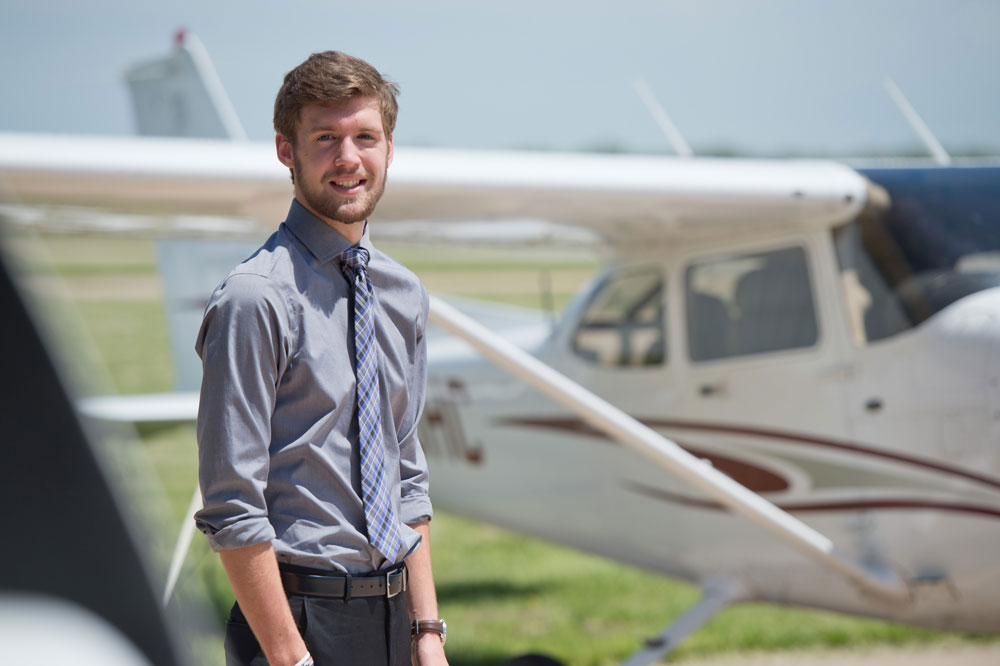Aviation – Professional Pilot (A.A.A.S.)
Associate Degree
The Aviation A.A.A.S degree offers tracks in Air Traffic Control and Professional Pilot-Flight.
Program Requirements
- Have a high school diploma and an unweighted GPA of 2.5 or above OR a GED certificate;
- Have a minimum 2.5 GPA for all completed higher education work;
- Have achieved one of the following: a minimum composite score of 19 on the ACT, a minimum combined critical reading and mathematics score of 990 on the SAT or an ACCUPLACER Next-Gen Score of 255 in Reading and 255 in Writing – only one ACCUPLACER retake allowed;
- English language proficiency – All Hesston College Aviation students, in accordance with Title 14 Code of Federal Regulations (CFR) Part 61, must be able to read, speak, write and understand the English language in order to meet the minimum eligibility criteria established by the FAA for airman certification. The FAA’s determination of English proficiency directly correlates to the International Civil Aviation Organization’s established criteria for Level 4 Operational Proficiency.
- Airman Medical Certificate – Each Hesston College Aviation student must obtain a First Class (1st Class) FAA Airman Medical Certificate issued by a FAA-authorized Aviation Medical Examiner (AME). Further information about obtaining an Airman Medical Certificate will be communicated upon acceptance to the Hesston College Aviation program.
Flight Training Prerequisites
Below are required items needed to start flight training at Hesston College
-
- FAA Requirements: The student must be able to read, speak, write and understand the English language, meet the physical standards for a third-class medical certificate and possess a valid student pilot certificate. The student must be 16 years old to solo, and 17 years old to gain certification.
- Medical Requirements: You are required to make an appointment with an FAA approved medical doctor to acquire your medical certificate. We ask that you get a first class medical. It is imperative that you have this medical certificate in hand before you fly. We can provide you with names of qualified physicians in your area or you can visit the following informative websites on aviation medicals located at The FAA’s Find an Aviation Medical Examiner (AME) They may help answer questions you have.
- Transportation Security Administration (TSA) Requirements: We are required to verify proof of U.S. citizenship. We need to see an ORIGINAL birth certificate and a current driver’s license or a current passport. TSA requires us to see the original (we will return your original to you after we have verified and copied the documentation).
If you are not a U.S. citizen, you will need to register with the TSA online at www.flightschoolcandidates.gov. This registration process takes approximately 1-2 weeks. Flight training will begin ONLY when we have a final approval from the TSA.
Plan of Study – (A.A.A.S. degree)
Professional Pilot-Flight Track Required Program Courses: 35 hours (grade of C or better required)
(AVIA 100/101 Private Pilot Principles I/II and AVIA 103/104 Private Pilot I/II) or (AVIA 107 Private Pilot Transition and FAA Private Pilot Certificate), AVIA 106 Airspace and Air Traffic, AVIA 121 Meteorology, AVIA 161 Aviation Regulations, AVIA 205 Aircraft Systems, AVIA 206 Aerodynamics and Aircraft Performance, AVIA 220/221 Instrument Flight I/II, AVIA 222 Instrument Rating Principles, AVIA 229 Commercial Pilot Principles, AVIA 230/231 Commercial Flight I/II, AVIA 254 Human Factors, AVIA 281 Aviation Safety.
First Year Program Courses
Fall Courses
- Private Pilot Principles I
- Private Pilot I
- Intro to Professional Aviation
- Meteorology
- Airspace and Air Traffic
Recommended Courses
- Speech Communication
- First-Year Experience
Spring Courses
- Private Pilot Principles II
- Private Pilot II
- Instrument Flight I
- Aviation Regulations
Recommended Courses
- College Writing I
- Lifetime Fitness and Wellness
- social science course
Summer Courses
- Instrument Flight II
- Instrument Rating Principles
Recommended Courses
- Biblical Literature
Second Year Program Courses
Fall Courses
- Commercial Pilot Principles
- Commercial Flight I
- Aircraft Systems
- Aerodynamics and Aircraft Performance
Recommended Courses
- humanities course
Spring Courses
- Commercial Flight II
- Aviation Safety
- Human Factors
Recommended Courses
- natural science course
- intercultural competence course
- mathematics course
Catalog 2024-25